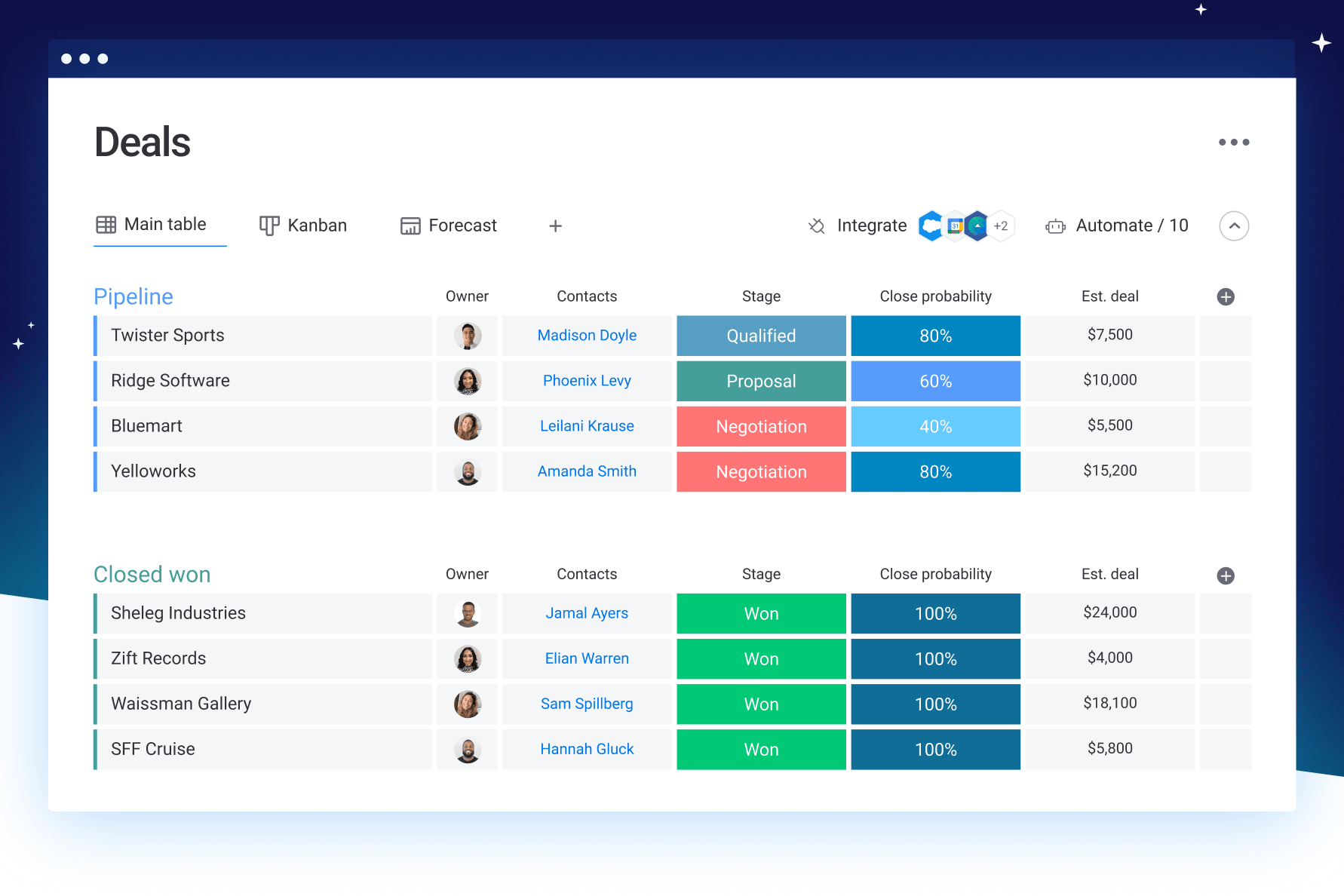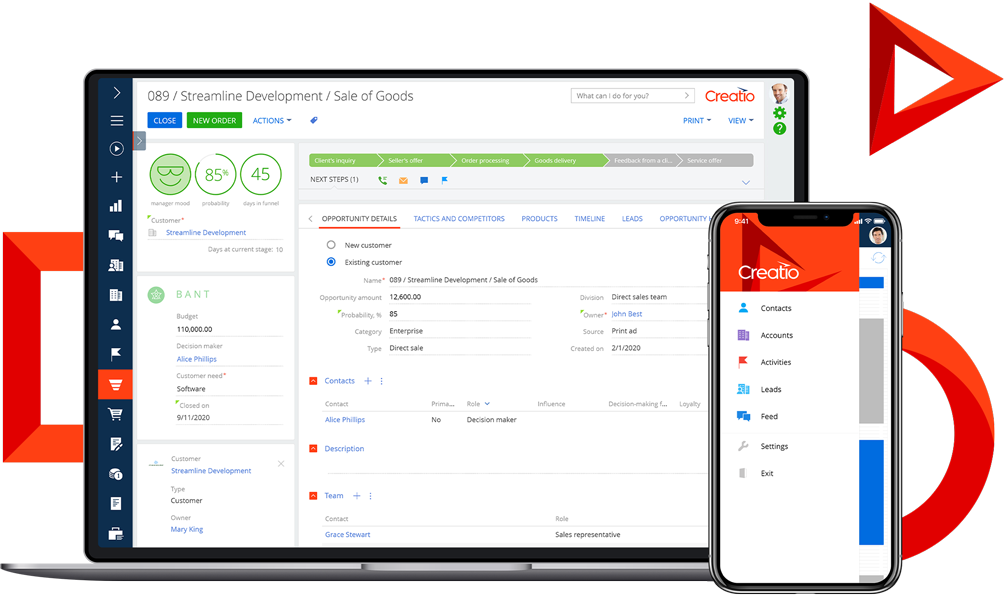The sales CRM program stands as a cornerstone of modern sales strategies, offering a comprehensive suite of tools designed to streamline and elevate sales processes. By harnessing the power of technology, businesses can gain invaluable insights into their sales pipelines, manage customer relationships effectively, and ultimately drive revenue growth.
Throughout this guide, we will delve into the intricacies of sales CRM programs, exploring their essential features, implementation strategies, and the myriad benefits they offer. We will also provide practical tips and best practices to help you maximize the potential of your CRM system and achieve exceptional sales performance.
Sales CRM Program Overview

A sales customer relationship management (CRM) program is a tool designed to help businesses manage their interactions with current and potential customers. It provides a centralized platform for tracking customer data, managing sales pipelines, and automating sales processes.
Sales CRM programs can enhance sales processes in several ways. They can help businesses:
- Identify and qualify leads
- Track customer interactions
- Manage sales pipelines
- Automate sales processes
- Generate reports and analytics
Key Benefits and Advantages
Implementing a sales CRM program can provide several key benefits and advantages, including:
- Improved sales productivity
- Increased sales conversion rates
- Enhanced customer satisfaction
- Reduced sales costs
- Improved sales forecasting
Features and Functionality

The core of a sales CRM program lies in its comprehensive features and functionalities that streamline the sales process, enabling teams to manage their pipelines efficiently. These features contribute significantly to effective sales management by providing a centralized platform for tracking customer interactions, automating tasks, and analyzing performance.
The customization capabilities of a sales CRM program are paramount, allowing businesses to tailor the program to their unique needs. By configuring custom fields, workflows, and dashboards, organizations can align the program with their specific sales processes, ensuring a seamless fit within their existing infrastructure.
Essential Features
- Contact Management:Centralized storage and organization of customer data, including contact information, communication history, and preferences.
- Lead Management:Tracking and qualifying leads throughout the sales pipeline, nurturing them towards conversion.
- Opportunity Management:Monitoring sales opportunities, tracking progress, and forecasting revenue.
- Task and Activity Management:Assigning and tracking tasks, scheduling appointments, and managing daily activities.
- Email Integration:Seamlessly integrating with email clients, allowing for automated email tracking and logging.
Importance of Customization
Tailoring a sales CRM program to specific business needs is crucial for maximizing its effectiveness. Customization allows organizations to:
- Align with Sales Process:Configure the program to match the unique stages and workflows of the sales process.
- Capture Relevant Data:Create custom fields to collect industry-specific or business-critical information.
- Automate Specific Tasks:Set up automated workflows to streamline repetitive tasks, saving time and effort.
- Generate Tailored Reports:Create customized dashboards and reports that provide insights aligned with business objectives.
Implementation and Integration
Implementing a sales CRM program is a critical step in optimizing sales processes and driving revenue growth. It requires careful planning, execution, and ongoing support to ensure successful integration into existing systems and adoption by sales teams.
The implementation process typically involves several key steps:
- Assessment and Planning:Define business objectives, gather requirements, and develop an implementation roadmap.
- Data Migration:Import and cleanse data from legacy systems to ensure accuracy and completeness.
- Customization and Configuration:Tailor the CRM to meet specific business needs, including workflows, dashboards, and reports.
- Integration:Connect the CRM with other systems, such as ERP, marketing automation, and customer support tools.
- Training and Adoption:Provide comprehensive training and support to ensure sales teams are proficient in using the CRM and embrace its benefits.
- Ongoing Monitoring and Maintenance:Regularly monitor system performance, address user feedback, and implement updates to maintain optimal functionality.
Challenges and Best Practices for Integration
Integrating a sales CRM with existing systems can pose challenges. Some common issues include:
- Data compatibility and inconsistencies
- Security and compliance concerns
- Process alignment and workflow optimization
To overcome these challenges, consider the following best practices:
- Map Data Fields:Ensure that data fields in the CRM align with those in existing systems.
- Establish Data Governance:Define data standards and protocols to maintain data integrity.
- Leverage Integration Tools:Utilize APIs, middleware, or third-party tools to facilitate seamless data exchange.
- Test and Validate:Conduct thorough testing to verify data accuracy and system functionality.
Importance of Training and Adoption by Sales Teams
Successful CRM implementation relies heavily on the adoption and proficiency of sales teams. Training programs should cover:
- CRM functionality and navigation
- Data entry and management best practices
- Workflows and automation features
- Reporting and analytics capabilities
Ongoing support and reinforcement are crucial to ensure sales teams fully embrace the CRM and maximize its benefits.
Data Management and Analytics
Effective data management is essential for any sales CRM program. It ensures that data is collected, stored, and organized in a way that makes it accessible and usable for analysis. This data can then be used to provide insights into sales performance, identify trends, and make informed decisions.
Data analysis can provide valuable insights into sales performance. By analyzing data on sales activities, customer interactions, and market trends, businesses can identify areas for improvement and develop strategies to increase sales.
Dashboards and Reporting Tools
Dashboards and reporting tools are essential for data visualization and decision-making. They provide a visual representation of data, making it easy to identify trends and patterns. This information can be used to make informed decisions about sales strategies, resource allocation, and customer service.
Customer Relationship Management: Sales Crm Program
A sales CRM program plays a pivotal role in fostering and maintaining strong customer relationships, serving as a central hub for managing interactions and nurturing connections.
By capturing and organizing customer data, preferences, and communication history, CRM systems provide a comprehensive view of each customer’s journey. This enables sales teams to tailor their approach, deliver personalized experiences, and build lasting relationships.
Tracking Customer Interactions and Preferences, Sales crm program
- CRM systems track customer touchpoints across multiple channels, including phone calls, emails, social media, and website visits.
- This consolidated view of interactions allows sales teams to understand customer behavior, identify trends, and tailor their communication strategies accordingly.
- By capturing customer preferences and feedback, CRM systems help sales teams personalize product recommendations, offers, and follow-ups, enhancing customer satisfaction and loyalty.
Improving Customer Satisfaction and Loyalty
- CRM systems empower sales teams to respond promptly to customer inquiries and resolve issues efficiently.
- Proactive outreach and personalized communication based on customer preferences foster positive experiences and strengthen relationships.
- By leveraging CRM data to identify customer pain points and areas for improvement, businesses can continuously enhance their products and services, leading to increased customer satisfaction and loyalty.
Sales Pipeline Management

A sales CRM program provides robust capabilities for managing sales pipelines, enabling businesses to track leads, opportunities, and forecasts effectively. It serves as a central hub for managing all aspects of the sales process, streamlining communication and collaboration among sales teams.
Lead Management
- Capture and qualify leads from various sources, including websites, forms, email campaigns, and social media.
- Assign leads to the appropriate sales representatives based on criteria such as industry, location, or product interest.
- Track lead activity, including emails sent, calls made, and appointments scheduled, to gauge engagement levels.
Opportunity Management
- Create and manage opportunities for qualified leads, capturing key details such as product/service interest, budget, and timeline.
- Track the progress of opportunities through various stages of the sales cycle, from initial contact to closing.
- Forecast sales based on the probability of closing opportunities, allowing for accurate revenue projections.
Automation Tools
Sales CRM programs offer a range of automation tools to streamline the sales process and increase efficiency.
- Lead scoring:Automatically assign scores to leads based on their engagement and fit with the company’s ideal customer profile.
- Email automation:Send personalized emails to leads and customers based on specific triggers, such as website visits or product inquiries.
- Task management:Assign and track tasks for sales representatives, ensuring timely follow-ups and completion of key activities.
Security and Compliance
Sales CRM programs handle sensitive customer data, making security and compliance paramount. Robust security measures and adherence to industry regulations are crucial to protect data and maintain customer trust.
Data protection and privacy are essential aspects of CRM security. CRM programs should employ encryption, access controls, and regular security audits to safeguard data from unauthorized access, breaches, or misuse.
Industry Regulations and Best Practices
- General Data Protection Regulation (GDPR):Protects the personal data of individuals within the European Union, requiring CRM programs to comply with strict data protection measures.
- California Consumer Privacy Act (CCPA):Grants California residents rights to access, delete, and opt out of the sale of their personal information, impacting CRM data collection and usage practices.
- ISO 27001:An international standard for information security management, providing guidelines for CRM programs to establish and maintain a comprehensive security framework.
Return on Investment
Investing in a sales CRM program can yield significant returns, but calculating the exact ROI can vary depending on the specific metrics and methods used. Nevertheless, there are several common approaches to estimating the ROI of a CRM system.
One method involves comparing the increase in sales revenue generated by the CRM system to the cost of implementing and maintaining the system. Another approach focuses on measuring the improvement in sales efficiency and productivity, which can be quantified by factors such as reduced sales cycles, increased deal closure rates, and improved customer satisfaction.
Additionally, CRM systems can contribute to cost savings by streamlining administrative tasks, automating processes, and reducing the need for manual data entry.
Examples of CRM-Driven Revenue Growth
- Increased sales revenue through improved lead generation and conversion rates.
- Enhanced cross-selling and up-selling opportunities, leading to higher average order values.
- Improved customer retention and loyalty, resulting in repeat purchases and referrals.
Long-Term Benefits and Sustainability of CRM Investments
The benefits of CRM investments extend beyond immediate revenue gains. By providing a centralized platform for managing customer data, sales pipelines, and marketing campaigns, CRM systems contribute to the long-term sustainability of sales operations. The insights derived from CRM data enable businesses to make informed decisions, optimize their sales processes, and build stronger relationships with their customers.
Moreover, CRM systems can facilitate collaboration between sales, marketing, and customer service teams, leading to improved alignment and overall organizational efficiency.
End of Discussion
In conclusion, the sales CRM program has emerged as an indispensable tool for businesses seeking to optimize their sales operations and gain a competitive edge in today’s dynamic market landscape. By embracing the transformative power of CRM technology, organizations can empower their sales teams with the insights, automation, and customer-centric capabilities they need to drive success and build lasting relationships with their clients.
FAQ Insights
What are the key benefits of implementing a sales CRM program?
Sales CRM programs offer numerous benefits, including improved sales visibility, enhanced customer relationship management, streamlined sales processes, increased productivity, and data-driven decision-making.
How can a sales CRM program help businesses manage their sales pipelines effectively?
Sales CRM programs provide robust pipeline management capabilities, enabling businesses to track leads, opportunities, and forecasts, automate sales processes, and gain insights into their sales performance.
What are the essential features to look for in a sales CRM program?
Essential features of a sales CRM program include contact management, lead tracking, opportunity management, sales forecasting, reporting and analytics, and integration with other business systems.
